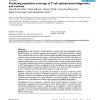Free Online Productivity Tools
i2Speak
i2Symbol
i2OCR
iTex2Img
iWeb2Print
iWeb2Shot
i2Type
iPdf2Split
iPdf2Merge
i2Bopomofo
i2Arabic
i2Style
i2Image
i2PDF
iLatex2Rtf
Sci2ools
BMCBI
2006
2006
Predicting population coverage of T-cell epitope-based diagnostics and vaccines
Background: T cells recognize a complex between a specific major histocompatibility complex (MHC) molecule and a particular pathogen-derived epitope. A given epitope will elicit a response only in individuals that express an MHC molecule capable of binding that particular epitope. MHC molecules are extremely polymorphic and over a thousand different human MHC (HLA) alleles are known. A disproportionate amount of MHC polymorphism occurs in positions constituting the peptide-binding region, and as a result, MHC molecules exhibit a widely varying binding specificity. In the design of peptide-based vaccines and diagnostics, the issue of population coverage in relation to MHC polymorphism is further complicated by the fact that different HLA types are expressed at dramatically different frequencies in different ethnicities. Thus, without careful consideration, a vaccine or diagnostic with ethnically biased population coverage could result. Results: To address this issue, an algorithm was d...
| Added | 10 Dec 2010 |
| Updated | 10 Dec 2010 |
| Type | Journal |
| Year | 2006 |
| Where | BMCBI |
| Authors | Huynh-Hoa Bui, John Sidney, Kenny Dinh, Scott Southwood, Mark J. Newman, Alessandro Sette |
Comments (0)

